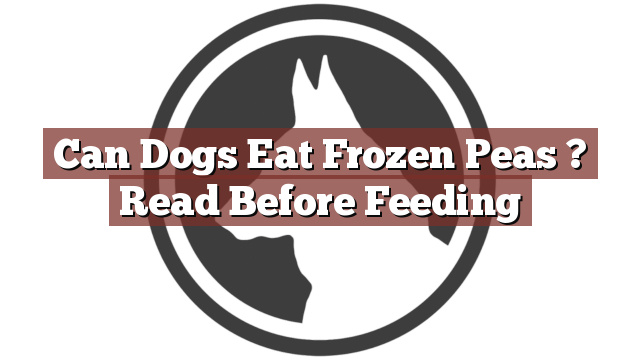Understanding Your Dog’s Dietary Needs
As a responsible dog owner, it is crucial to understand your furry friend’s dietary needs. Dogs are omnivores, which means they can consume a variety of foods including both meat and plant-based products. While a majority of their diet should consist of high-quality dog food, it is natural for dog owners to wonder about incorporating other foods into their pet’s diet.
Can dogs eat frozen peas? The simple answer is yes. Dogs can consume frozen peas, and in fact, they can provide several health benefits. Peas are packed with nutrients such as vitamins A, B, and K, as well as fiber and protein. These nutrients promote good digestive health and can boost your dog’s overall immunity. Additionally, frozen peas can be a tasty and refreshing treat for your furry friend, especially during hot summer months.
Pros and Cons of Feeding Frozen Peas to Dogs
Feeding your dog frozen peas can have both advantages and disadvantages. Here are some pros and cons to consider before incorporating peas into your dog’s diet.
Pros:
-
Nutritional Value: Frozen peas are a great source of vitamins and minerals that are essential for your dog’s overall health. They contain vitamin A, which promotes good vision, and vitamin K, which supports bone health.
-
High in Fiber: Peas are rich in fiber, which aids in digestion and helps maintain a healthy weight for your dog.
Cons:
-
Portion Control: While frozen peas can be a healthy addition to your dog’s diet, it is important to control the portion size. Too many peas can cause digestive upset, leading to gas or diarrhea.
-
Allergic Reactions: Some dogs may have allergic reactions to peas. If you notice any signs of an allergic reaction such as itching, redness, or swelling, it is best to avoid feeding your dog peas and consult with a veterinarian.
Conclusion: Considerations for Feeding Frozen Peas to Your Dog
In conclusion, while dogs can safely consume frozen peas, it is essential to consider portion control and potential allergic reactions. As with any new food, it is recommended to introduce peas gradually into your dog’s diet and monitor for any adverse reactions. If your dog enjoys peas and benefits from their nutritional value, they can be a healthy addition to their diet. However, it is always advisable to consult with your veterinarian before making any significant changes to your dog’s diet to ensure it aligns with their specific needs and health conditions.
Thank you for taking the time to read through our exploration of [page_title]. As every dog lover knows, our furry friends have unique dietary needs and responses, often varying from one canine to another. This is why it's paramount to approach any changes in their diet with caution and knowledge.
Before introducing any new treats or making alterations to your dog's diet based on our insights, it's crucial to consult with a veterinarian about [page_title]. Their expertise ensures that the choices you make are well-suited to your particular pet's health and well-being.
Even seemingly harmless foods can sometimes lead to allergic reactions or digestive issues, which is why monitoring your dog after introducing any new food item is essential.
The content provided here on [page_title] is crafted with care, thorough research, and a genuine love for dogs. Nevertheless, it serves as a general guideline and should not be considered a substitute for professional veterinary advice.
Always prioritize the expert insights of your veterinarian, and remember that the health and happiness of your furry companion come first.
May your journey with your pet continue to be filled with joy, love, and safe culinary adventures. Happy reading, and even happier snacking for your canine friend!

